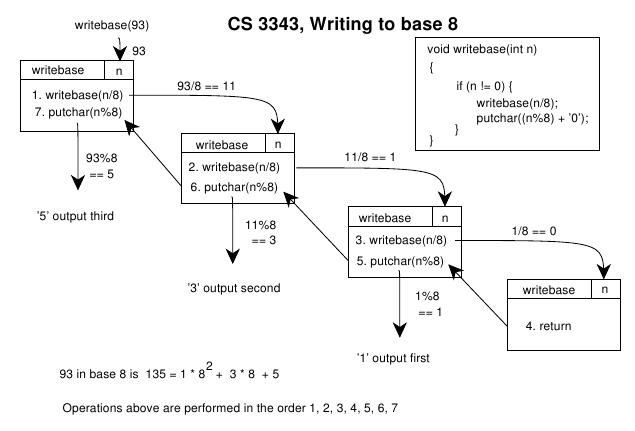
(Click image for larger version, or here for a PDF.
CS 3343/3341 Introduction to Algorithms |
Number Base Conversion
|
n = 93. Repeatedly divide by 8 and take the remainder.
Then repeat with the quotient by 8. Stop at 0 quotient.
93%8 == 5 (remainder) and 93/8 == 11 (quotient)
11%8 == 3 (remainder) and 11/8 == 1 (quotient)
1%8 == 1 (remainder) and 1/8 == 0 (quotient)
|
| Java | C Language |
|---|---|
public void writebase(int n) {
while (n > 0) {
push(n%8);
n = n/8;
}
while (!empty())
System.out.print(pop());
}
| void writebase(int n) {
while (n > 0) {
push(n%8);
n = n/8;
}
while (!empty())
printf("%i", pop());
}
|
| Java | C Language |
|---|---|
// BaseConvert: convert to base 8
public class BaseConvert {
public int[] s = new int[100]; // storage for stack
public int top = 0; // points one above top
public int pop() { return s[--top]; }//pop, return top
public void push(int n) { s[top++] = n; } // push item
public boolean empty() { return top == 0; } // empty?
public void writebase(int n) {
while (n > 0) {
push(n%8);
n = n/8;
}
while (!empty())
System.out.print(pop());
}
public static void main(String[] args) {
int n = 93;
BaseConvert baseConvert = new BaseConvert();
baseConvert.writebase(n);
System.out.println(" is the value of " +
n + " (base 8)");
}
} | // baseconvert.c: convert to base 8
#include <stdio.h>
int s[100]; // storage for the stack
int top = 0; // points one above top
int pop() { return s[--top]; }//pop, return top
void push(int n) { s[top++] = n; } // push item
int empty() { return top == 0; } // empty?
void writebase(int n) {
while (n > 0) {
push(n%8);
n = n/8;
}
while (!empty())
printf("%i", pop());
}
int main() {
int n = 93;
writebase(n);
printf(" is the value of %i (base 8)\n", n);
}
|
Common Output: 135 is the value of 93 (base 8) | |
| Java | C Language |
|---|---|
// BaseConversion.java: convert to base 8
public class BaseConversion {
public void writebase(int n) {
if (n != 0) {
writebase(n/8);
System.out.print(n%8);
}
}
public static void main(String[] args) {
int n = 93;
BaseConversion baseConversion =
new BaseConversion();
baseConversion.writebase(n);
System.out.println(" is the value of " +
n + " (base 8)");
}
}
| // convert.c: convert to base 8
#include <stdio.h>
void writebase(int n) {
if (n != 0) {
writebase(n/8);
printf("%i", n%8);
}
}
int main() {
int n = 93;
writebase(n);
printf(" = %i (base 8)\n", n);
} |
Output: 135 is the value of 93 (base 8) | Output: 135 = 93 (base 8) |

| BaseConversion, With and Without Recursion (both sides are Java) | |
|---|---|
// BaseConversion: convert to base 8
public class BaseConversion {
public void writebase(int n) {
System.out.println("Enter writebase, n = " + n);
if (n != 0) {
writebase(n/8);
System.out.println("Printing: " + n%8);
}
System.out.println("Leave writebase, n = " + n);
}
public static void main(String[] args) {
int n = 93;
BaseConversion baseConversion =
new BaseConversion();
baseConversion.writebase(n);
System.out.println(" is the value of " + n +
" (base 8)");
}
}
| // BaseConversion0: convert to base 8, NO RECURSION
public class BaseConversion0 {
public void writebase0(int n) {
System.out.println("Enter writebase0, n = " + n);
if (n != 0) {
writebase1(n/8);
System.out.println("Printing: " + n%8);
}
System.out.println("Leave writebase0, n = " + n);
}
public void writebase1(int n) {
System.out.println("Enter writebase1, n = " + n);
if (n != 0) {
writebase2(n/8);
System.out.println("Printing: " + n%8);
}
System.out.println("Leave writebase1, n = " + n);
}
public void writebase2(int n) {
System.out.println("Enter writebase2, n = " + n);
if (n != 0) {
writebase3(n/8);
System.out.println("Printing: " + n%8);
}
System.out.println("Leave writebase2, n = " + n);
}
public void writebase3(int n) {
System.out.println("Enter writebase3, n = " + n);
if (n != 0) {
writebase0(9999); // not called
System.out.println("Printing: " + n%8);
}
System.out.println("Leave writebase3, n = " + n);
}
public static void main(String[] args) {
int n = 93;
BaseConversion0 baseConversion0 =
new BaseConversion0();
baseConversion0.writebase0(93);
System.out.println(" is the value of " + n +
" (base 8)");
}
}
|
| Output, blue = output of the original program, red = differences from left to right | |
Enter writebase, n = 93 Enter writebase, n = 11 Enter writebase, n = 1 Enter writebase, n = 0 Leave writebase, n = 0 Printing: 1 Leave writebase, n = 1 Printing: 3 Leave writebase, n = 11 Printing: 5 Leave writebase, n = 93 is the value of 93, base 8 | Enter writebase0, n = 93 Enter writebase1, n = 11 Enter writebase2, n = 1 Enter writebase3, n = 0 Leave writebase3, n = 0 Printing: 1 Leave writebase2, n = 1 Printing: 3 Leave writebase1, n = 11 Printing: 5 Leave writebase0, n = 93 is the value of 93, base 8 |